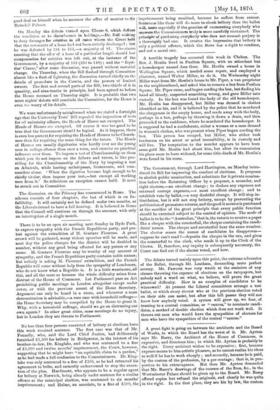No leas than four persons convicted of bribery at elections
have this week received sentence. The first case was that of Mr. Fennelly, who, said the Lord Chief Justice, had deliberately furnished £.1,500 for bribery in Bridgwater, in the interest of his brother-in-law, Dr. Kinglake, and who was sentenced to a fine of 21,000 and twelve months' imprisonment, the Court, however, suggesting that he might have "an equitable claim to a pardon," as he had made a full confession to the Commissioners. Dr. King- lake was only sentenced to a fine of 2250, as he had retracted his agreement to bribe, and earnestly endeavoured to stop the execu- tion of the plan. Hardiment, who appears to be a regular agent for bribery at Norwich, being already under sentence for a similar offence at the municipal election, was sentenced to six months' imprisonment ; and Hulme, an associate, to a fine of 1100, the imprisonment being remitted, because he suffers from cancer. Sentences like these will do more to check bribery than the ballot will, more especially if ths,practiese of exonerating everybody who answers the Commissioness truly is more carefully restrained. The principle cif pardoning everybody who does not commit perjury is a thoroughly bad one. It creates the impression that bribery is only a political offence, which the State has a right to condone, and not a moral one.






























 Previous page
Previous page